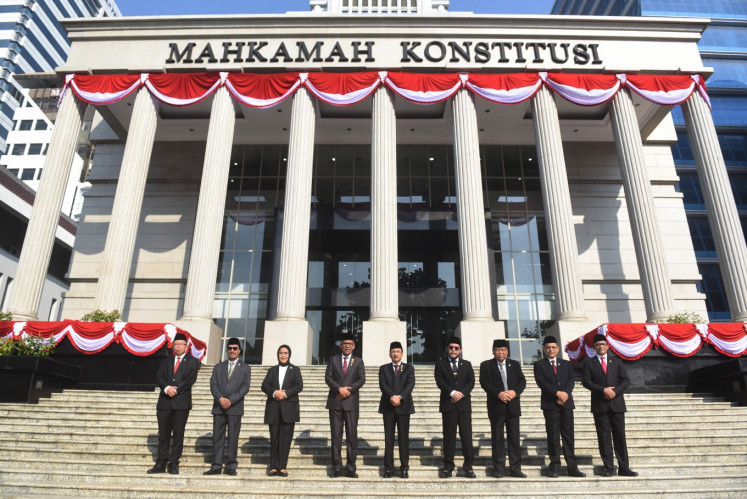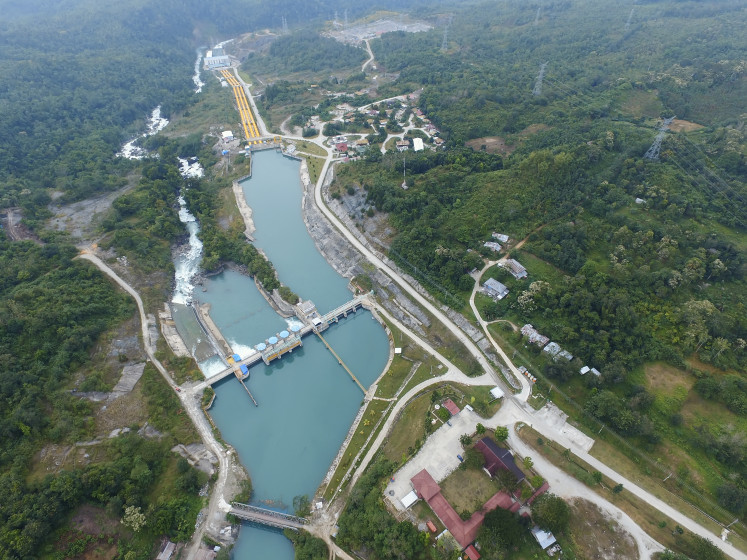Popular Reads
Top Results
Can't find what you're looking for?
View all search resultsPopular Reads
Top Results
Can't find what you're looking for?
View all search resultsBoreh: Esoteric herbs for a healthy community
The process: More than two dozen herbs are mixed to make a boreh herbal treatment at Boreh Pijat in Ubud
Change text size
Gift Premium Articles
to Anyone

The process: More than two dozen herbs are mixed to make a boreh herbal treatment at Boreh Pijat in Ubud.
Deep within the bowels of Galiran market in Klungkung one can find boreh seller Made Prawata. Getting to his stall demands bustling through traders of all sorts along the road to the market, passing through the mud when it rains and jumping out of the way of minivans loaded to roof with produce from across the island.
This is a real Balinese market with something unexpected and unknown at every turn.
Prawata's stall is in the market proper. It is dimly lit, with kiosks spilling over with red and black rice from Java, fresh soy beans, dried corn kernels, the makings for offerings and red tomatoes. Through it all, there is the pungent aroma of dried fish as you hunt for Prawata's stall ' a fixture here for several generations.
He sells assorted varieties of boreh, such as Sindrong Rangkep, a mix of dozens of herbs and spices believed to ease rheumatism; as well as Yag, to cure colds and flus; and others said to be good for skin ailments.

Prawata, however, says that he only sells remedies that have been specially prepared by holy men. 'Priests buy the ingredients from me and then combine them into cures. It's a special knowledge, but anyone who has that knowledge can make the boreh, not just priests.'
According to Prawata, the recipes for boreh were brought to Bali in the 13th century by Majapahit families as they fled Java. Their understanding of the benefits of herbs have been handed down through the ages, becoming what Prawata describes as a range of traditional herbal cures specific to Bali.
Made Sumendra of Boreh Pijat on Jl. Gotama in Ubud also believes in the restorative benefits of herbal cures and wants to encourage their use in the community. He is well known locally. With his late wife, Laurie Billington, he established the Pondok Pekak Library and Learning Centre two decades ago.
The primary goal of Sumendra in establishing Boreh Pijat was the community. 'I am worried about the future. With every one doing things for tourists, there is no place for locals to get healed. I had a problem with my back and neck, and for a year I could not sleep.'
He tried many things, but to no avail, Sumendra said. 'Then I heard that in Batuan village there was a guy who understood Boreh, pak Ketut Jaya. With his skills, I got better and at the same time I saw a chance to bring these skills to our community.'
Keeping costs down is key for reaching local residents. While the price of a massage, boreh treatment and herbal sauna is US$13.50, the boreh itself only costs $3.
'We need to have this type of treatment available ' everybody gets stressed and they are busy so we opened this place especially for locals,' Sumendra says.

Ketut Jaya, at 46, has been working with herbs since he was a small child. He learned to make herbal remedies known as jamu from his mother, whose life was saved, according to Ketut, by boreh and a simple act of kindness.
Ketut said that his mother, who had been ill for years before his birth, was eventually cured by herbal medicine from Griya Mambal.
'The story was that she had been tied up one day, because she was crazy, and she broke free and ran to Purnama Beach. There people say my mom drowned in the sea,' Ketut says. 'She was washed back to shore by the waves and her clothes were torn off by the surf. She was naked. Some rice farmers saw this and one ibu felt sorry for my mom and wrapped her in a sarong.'
Things have been better since, he says. 'From that story I have a goal to help people, because someone helped my mom.'


Despite learning to make jamu from his family, Ketut had to look outside to learn how to make boreh. While the techniques and herbal mixes are usually passed down through generations, much of what Ketut has learned has been through personal discovery. 'Perhaps it is all upside down and this knowledge is now starting from me.
His esoteric boreh-and-massage system uses tools such a cow horn with a jade stone inset in, a shark's tooth (used for reflexology) and stems from the sacred dadap tree that are placed between the toes to harness and remove negative energy.
The main thrust of boreh is to increase blood circulation, says Ketut. In the past, rice farmers would return from their fields cold and muddy. They would apply Boreh to warm themselves and reinvigorate their circulation.

'Boreh is the energy of life. 'Bo' in Balinese means 'ready'. 'Reh' comes from the Balinese word for blood, 'rah. So Boreh brings your blood to life. Your blood is alive and your body is moving. I did not learn this from books, but from a patient,' says Ketut.
Ketut and Sumendra bring this health system to the public in a small compound that has at its entrance a garden where people can learn about the dozens of herbs that go into the boreh and the others that are infused into the steam of the sauna, another ancient key to health.
'Sauna is a tradition in Bali. In the old days people would cover their skin with boreh then be wrapped in a pandanus leaf mat under the sun. That created a sauna,' says Sumendra, who with Ketut Jaya is doing good for the sake of his community.
'Images J.B.Djwan









